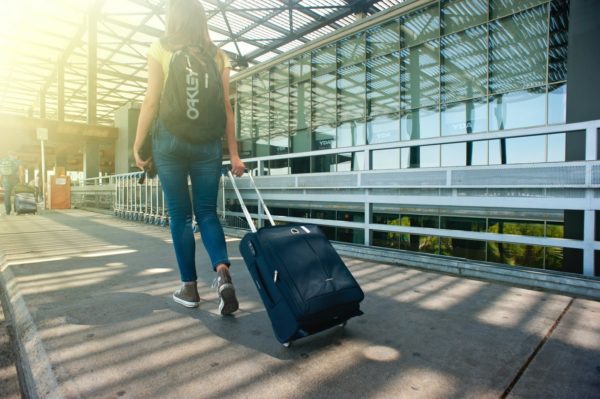Moving to another country is one of the biggest decisions you will ever make. Leaving your life, family, and friends behind in the search for broader horizons is something that few of us will ever do. Although new surroundings and fresh beginnings can bring about amazing opportunities, moving abroad has its risks. It can be daunting at the best of times.
By the numbers, just 3.5% of the world’s population lives outside of the country they were born in. However, migration figures have been increasing rapidly for decades, and have already blown projected figures out of the water. More and more people are heading for distant shores every day.
If you’ve decided to take a leap and move to a different country, there are a lot of things to organise. It’s easy to assume that all you need to do is buy your plane ticket, pack your bag, and get going. Although this is an admirable mindset, it’s unrealistic and, ultimately, unhelpful.
For first-time movers, it’s important to be well organised and prepared. This will help make the move as enjoyable and stress-free as possible. It’s advantageous to organise certain things ahead of your move as your regular services might not be as readily available in your new country. It’s also essential to research and be ready to face a new culture.
Here are twelve tips, making up your essential guide for moving to a new country for the first time. The guide includes actions to take before and after your move.

Photo by VisionPic .net from Pexels.
-
Save, save, and save some more
Moving to a different country is stressful enough without having to worry about your finances. Save as much as you possibly can before making the move. Ensure that you have a rainy day fund in case things don’t work out as planned.
There is no set amount that you should save. The price of rent, housing, and cost of living varies significantly from country to country. Save according to the living costs of your new country.
Here are some factors you may not have considered:
- Your accommodation may have hidden costs, such as two months rent, and an up-front deposit.
- Transport upon arrival.
- Taxes.
- Cost of utilities.
- Gym membership, phone expenses, and internet costs.
- What date you will receive your first paycheck.
Monthly budgeting is always beneficial.
-
Secure a place to live
A big mistake that people make when moving to a new country is that they don’t organise long-term living beforehand. Many movers book a hostel or hotel for their first few weeks, assuming that finding a place to stay will be straight forward upon arrival.
It’s easy to become overwhelmed, stressed, and compromised when trying to secure accommodation from a shared dorm or hotel bedroom. Transport, familiarity with the area, language, and cultural barriers can make this a difficult process.
Prioritize your living space before you move.
-
Explore job prospects
A lot of you might be moving country because of a job opportunity. Others move because the prospects of jobs are higher than the country in which they currently reside.
Ensure that you explore the market and make sure you are eligible for the jobs you are looking for. Don’t be afraid to take on part-time work, or a job that you are overqualified for. These types of jobs can help you to settle in and meet people quicker. They can also provide you with valuable revenue while you look for something more permanent.
-
Research your destination
You’re likely to have done a considerable amount of research on your destination. The more you know about where you’re going, the more comfortable you’ll feel upon arrival. Research the amenities, transportation, and any other useful details about the locality.
-
Get your visa in order
Depending on where you are moving to, you will require a specific visa or none at all. Contact the relevant embassy and complete the visa process ahead of time. Visa processes can be lengthy and require a lot of paperwork.
It’s also important that you secure the right visa. Ensure that you get a visa to allow you to work, study, or complete the duties that you need to do.
-
Banking
Research local banks in your new destination. Find out what information you would require to set up a bank account should you need to.
If you get a job for a company based in a different country, a regional bank account may be a necessity. Some local amenities might not be able to process foreign bank cards.
If you work for a company in your home country while living abroad, you should continue to use your regular bank account. This will maintain your credit score and continue any direct debits or loan payments that you’re responsible for.
Online banks are a relatively new trend that might be useful to you before you set up a local account.
-
International healthcare and insurance
The health care system in a country should have at least some impact on your decision to move there. In the event of illness or an accident, you want to know that you will be taken care of appropriately. In many scenarios, private health insurance is the best option.
Contact your insurer and inform them of your travel plans prior to the move. You might have to make some slight adjustments to your policy.
-
Organise a phone network and sim card
You don’t need to have a local sim card before you move, but its a good idea to know what provider and plan you’re going to subscribe to once you go there.
Make sure that your phone is unlocked so that a new network can be carried.
-
What are you doing with your stuff?
If you’re lucky enough to have family or friends willing to store your belongings, there’s no need to worry. If your move is long term, you will have to decide what to do with your belongings. If you haven’t made a major move before, you might be astonished at how many things you actually have.
Selling what you don’t need can be empowering, practical, and financially beneficial. Shipping your things might be costly, unnecessary, and hard to arrange. Hiring a storage unit can be a good option but costly. You will have to consider all options.
Embrace the culture
Whether your move is near or far, there is bound to be some form of cultural change. Culture shock is normal, but you should be prepared.
Although it’s important to hold on to your personal lifestyle and culture, you must respect and embrace the culture of your new country. For example, if you’re moving to an Islamic country and you’re not a Muslim, you should respect their beliefs and values. Take part in local customs, donate Qurbani, and be open to learning.
-
Get copies of important documents
You may need personal identification, medical records, your birth certificate, and other important documents at any time. It’s always beneficial to have copies of these on hand.
You should also enquire whether your diver’s licence or other qualifications are valid in your new country.
-
Get involved in the ex-pat community
You’re probably one of many ex-pats in your new city. Join Facebook groups, research online, and find out where ex-pats socialise. Reach out and become an active member of the community. Typically, these groups are very supportive and provide some of the best social outlets when you first move. Other ex-pats can not only welcome you to an area, but they can also give you some help and advice on how to get settled.



